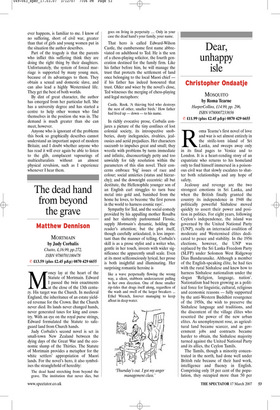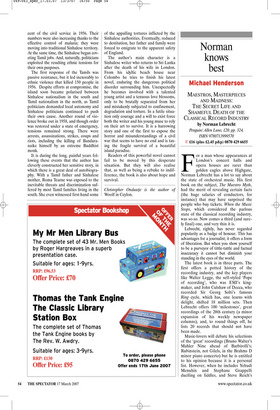Dear, unhappy isle
Christopher Ondaatje
MOSQUITO by Roma Tearne HarperCollins, £14.99, pp. 296, ISBN 9780007233656 ✆ £11.99 (plus £2.45 p&p) 0870 429 6655 Roma Tearne’s first novel of love and war is set almost entirely in the strife-torn island of Sri Lanka, and sweeps away only in its final pages to Venice and to London. It is a heart-rending story of an expatriate who returns to his homeland only to find himself immersed in a poisonous civil war that slowly escalates to shatter both relationships and any hope of safety.
Jealousy and revenge are the two strongest emotions in Sri Lanka, and when the British finally granted the country its independence in 1948 the politically powerful Sinhalese moved quickly to assert their power and position in politics. For eight years, following Ceylon’s independence, the island was governed by the United National Party (UNP), really an interracial coalition of moderate and Westernised élites dedicated to peace and stability. In the 1956 elections, however, the UNP was replaced by the Sri Lanka Freedom Party (SLFP) under Solomon West Ridgeway Dias Bandaranaike. Although a member of the English-speaking élite, he had ties with the rural Sinhalese and knew how to harness Sinhalese nationalism under the slogan ‘Religion, language, nation’. Nationalism had been growing as a political force for linguistic, cultural, religious and economic reasons — fully supported by the anti-Western Buddhist resurgence of the 1950s, the wish to preserve the Sinhalese language and traditions, and the discontent of the village élites who resented the power of the new urban elites. As unemployment rose, as agricultural land became scarcer, and as government jobs and contracts became harder to obtain, the Sinhalese majority turned against the United National Party and its allies, the Ceylon Tamils.
The Tamils, though a minority concentrated in the north, had done well under British rule because of their hard work, intelligence and fluency in English. Comprising only 18 per cent of the population, they occupied more than 50 per cent of the civil service in 1956. Their numbers were also increasing thanks to the effective control of malaria; they were moving into traditional Sinhalese territory. At the same time, the Sinhalese began coveting Tamil jobs. And, naturally, politicians exploited the resulting ethnic tensions for their own purposes.
The first response of the Tamils was passive resistance, but it led inexorably to ethnic violence that killed 150 people in 1956. Despite efforts at compromise, the island soon became polarised between Sinhalese nationalism in the south and Tamil nationalism in the north, as Tamil politicians demanded local autonomy and Sinhalese politicians continued to push their own cause. Another round of violence broke out in 1958, and though order was restored under a state of emergency, tensions remained strong. There were arrests, assassinations, strikes, coups and riots, including the killing of Bandaranaike himself by an extreme Buddhist monk.
It is during the long, painful years following these events that the author has cleverly constructed her sensitive story, in which there is a great deal of autobiography. With a Tamil father and Sinhalese mother, Roma Tearne was exposed to the inevitable threats and discrimination suffered by most Tamil families living in the south. She even witnessed first-hand some of the appalling tortures inflicted by the Sinhalese authorities. Eventually, reduced to destitution, her father and family were forced to emigrate to the apparent safety of England.
The author’s main character is a Sinhalese writer who returns to Sri Lanka after the death of his wife in London. From his idyllic beach house near Colombo he tries to finish his latest novel, enduring the dangerous political disorder surrounding him. Unexpectedly he becomes involved with a talented young artist and a tenuous love blossoms, only to be brutally separated from her and mistakenly subjected to confinement, degradation and torture. In a futile situation only courage and a will to exist force both the writer and his young muse to rely on their art to survive. It is a harrowing story and one of the first to expose the horror and misunderstandings of a civil war that seems to have no end and is taxing the fragile survival of a beautiful island paradise.
Readers of this powerful novel cannot fail to be moved by this desperate situation. But they will also realise that, as well as being a rebuke to indifference, the book is also about hope and survival.



































































































 Previous page
Previous page